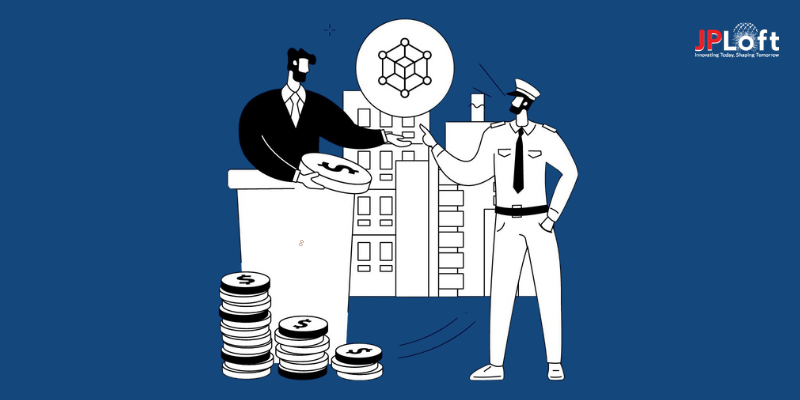Blockchain is the most well-known term used in technology at the moment. It is among the most critical technologies that could help businesses transform in a new manner. However, many companies still need to discover the advantage of blockchain technology.
Similar to any other industry that is tech-oriented, generally, Fintech is also developing. Many new fintech-related apps are emerging daily, providing new methods to manage and process payments.
Fintech owns the most significant portion of the blockchain market, and it's for a reason. In 2028, the Fintech market is expected to be worth $36.04 billion. Decentralized finance (DeFi) is a revolutionary financial technology that uses Blockchain to limit banks' influence on financial services. It will be an innovative financial technology that utilizes Blockchain. We'll see a change in how we send, receive, and store our money over the coming years.
What's FinTech Blockchain?
Fintech is set to begin a brand new phase in 2022. Numerous fintech companies have thrived since 2000. In the last few years, many companies have experienced tremendous success using modern technology and solutions centered on customers to resolve issues within today's financial system.
DeFi, also known as Decentralized Finance, is the newest emerging star that uses decentralized intelligent contracts. Numerous financial institutions have begun investing in blockchain technology to finance R&D. This proves that finance and blockchain companies don't have to conflict. They can complement each other and enhance their performance.
DeFi is all about the integration of Fintech and Blockchain. Although they're not identical, there is a great deal of similarity between their applications in financial services. Blockchain is well-known for its decentralized, distributed, transparent, immutable ledger technology. This offers a new degree of security and independence. Blockchain components in DeFi firms provide an alternative to traditional financial elements. Stablecoins are a cryptocurrency that customers can use directly and eliminate the need for an intermediary.
Must Read : Top 5 Blockchain Development Frameworks in 2024
Optimizing Fintech Using Blockchain Technology
Despite numerous technological improvements and integrations, the finance sector continues to function as an integral model. The core of the model is financial institutions and the government. Although it's an old custom, many consumers of financial services are starting to question its worthiness.
This is the reason for the rise of blockchain development services. Fintech has taken on a different dimension due to technology, described as a technological revolution in the financial sector. It has brought about significant adjustments to operating models and business models within the fintech industry and has created new possibilities for the industry.
Startups and financial application development businesses have expressed keen interest in exploring Blockchain's role in Fintech. We'll be discussing this in the following article.
Before we dive deep into the specifics of the Blockchain's use in the financial sector, it is crucial to ensure everyone knows the basics of what Blockchain means and how it functions.
Let's say you're aware of Blockchain. Let's now look at the Fintech issues this technology has solved.
Fintech Industry Blockchain's Challenges
Management mistakes in the fintech sector often lead to missing goals, delayed raising cycles and increasing losses. Here are a few problems blockchain technology could solve in the fintech industry:
1. Relying on the central system
Fintech development solutions provide convenience; however, third parties still control the power. Transactions remain under the supervision of higher-up authorities, and customers are waiting for confirmation.
This is the first issue that blockchain technology has solved in Fintech.
2. It is impossible to trust anyone.
The users usually need to be made aware of what's happening on the other side whenever they take action using fintech apps. This creates confusion and increases anxiety about identity theft, which eventually reduces confidence.
This issue with Fintech could be solved through blockchain-based solutions. The characteristics of its Blockchain transparency, immutability, and transparency are the main characteristics of blockchain technology.
3. Processes are slower
Fintech also requires a blockchain platform since the involvement of third parties can impede processes. This can lead to lower satisfaction and instability in the business economy.
4. Costs of operations are more expensive
It's all about time within the Fintech market. Blockchain technology is a Fintech trend that helps reduce the dependence on multiple parties, making the process easier and shortening the time needed.
You may have caught an idea of the importance of blockchain networks in finance from the prior section. We will now look at the implications of decentralized financial technology (Defi).
It is the Fintech Industry is Reviving with Blockchain Platform
The most effective way to comprehend and evaluate the effects of blockchain tech on fintech technology is by focusing on areas of economic importance. We'll now look at the subparts.
1. Payments from banks and P2P
In most banks, there is a lot of indeterminate bureaucracy and incompetence that could be more imprudent. This is especially true in the clearing and settlement areas.
These gaps arise from how banking operates and the fact that it is involved at different layers of hierarchy. There is a way to eliminate these gaps by establishing a decentralized system that uses different consensus algorithms for speedier transactions. This lets you utilize blockchain technology in financial services.
Accenture believes blockchain software development can save the world's largest investment bank around 10 billion dollars by allowing it to be used in settlement and clearing banking. The Australian Securities Exchange is thought to have already an initiative to share post-trade settlement, clear, ring, and settlement services in a Blockchain system.
Banks are aware of the real advantages of blockchain technology in the field of finance (using digital currency instead of conventional ones),like speedier transaction times, reduced cost of transactions, and so on. Financial institutions across the globe are being encouraged to explore the possibility of switching to digital currencies and the possibilities of fintech solutions.
The current system of payment could be more efficient, too. This is why it is necessary to find a new way of paying. Cryptocurrencies might be a solution.
Three primary financial services are available today: international money transfer and online payments, credit card transactions, and international payments.
The credit card was invented before the introduction of the internet. Therefore, it was created to make physical payments, not online payments. The significant issues with online credit card transactions are excessive processing charges and security, fraud, and other issues. These issues can be quickly resolved using Blockchain banking and other financial services.
The international payment system is in its beginnings. The system is a closed and regulated system that is compartmentalized. International payments may take more than one day and cannot be completed during regular hours of operation. Your payment will go through multiple banks, each with its processes, before reaching its final destination. This can increase the amount of work required to cross-check information. This is where the cryptocurrency is valuable.
Companies developing blockchain products are working to integrate technology into financial technology and banking. This resolves the issue of ensuring that data is checked across different organizations involved in international money transfers.
Ultimately, banks will be accessible to people who aren't banked. The decentralized ledger system will permit people who can't open bank accounts to use banking services on their phones. McKinsey states that approximately 2.5 billion people need help to access banking facilities. This is close to half the world's adult population. A large portion of them have smartphones. Smartphones are great for making and receiving live pay and for access to microcredit.
2. Trading finance, trade transactions, and Trade Finance
Trade finance is still based on circulating paper across the globe to confirm data. The documents continue to be faxed and posted. Share purchase transactions and stock purchases still require a lengthy clearing brokerage and settlement procedure. Settlement typically lasts three days, but extending this timeframe to weekends is possible because each trader has to maintain their database of transaction-related documents. Additionally, they must constantly compare these databases to ensure greater precision.
Blockchain tech can easily be integrated into financial services, allowing traders to avoid heavy counterparty checks and streamline the process. This lowers, speeds up the settlement process and increases the accuracy of trades.
3. Crypto lending
The financial industry has adopted crypto lending as a fair and effective method of lending money. The borrower can use their crypto assets to obtain an unsecured fiat-based or stablecoin loan, and lenders supply the necessary assets for the loan at a set interest rate. This can also be done in reverse. Some borrowers use their fiat or stable coins as collateral for obtaining crypto assets.
4. Conformity to the rules
This is an excellent illustration of the use of Blockchain in the fintech industry.
Fintech companies are using Blockchain to increase compliance with regulations, as the need for services regulating the public is predicted to grow soon. Blockchain technology can be used to record every verified transaction and keep track of all actions performed by those involved. This technology allows regulators to look at the original documents only and the original documents, not duplicate copies.
The immutability of blockchain technology can also help reduce the possibility of mistakes, ensure the accuracy of audit and financial report records, and reduce the expense and time involved in auditing and accounting.
5. Digital identity
There's a growing number of fake accounts. Even though banks conduct strict KYC/AML checks, they're not 100% secure. Secure banks that are not hacked are more secure because clients have to provide no standard form of documentation to prove their identity.
Blockchain can be used to establish an electronic identity system. Customers can be validated at one time and later use them to conduct transactions anywhere around the globe. Blockchain is also a great tool to help users of financial services.
-
Control identity data
-
Sharing information with others is possible without safety risks.
-
You can sign digital documents like transactions and claims.
6. Auditing
This procedure examines accounts and points out contradictions. It's complex and takes a long time. Blockchain technology makes the process simpler. Using the technology to get your companion to join the data to the ledger is possible. This will help make updating and looking at the data more straightforward.
7. New models for crowdfunding
Crowdfunding can be a method used to raise money. It involves asking large amounts of people for a small amount of money via the internet. The crowdfunding process is simple and more efficient than traditional funding models because of ICO, IEO, and other strategies. This is why ICOs have performed better than the VC funding model.
You might be curious about what the future has in store for blockchain and fintech applications. You'll eventually be able to follow the correct steps. It is crucial to know how fintech companies use blockchain management to improve your outcomes.
Let's discuss a few advantages of blockchain technology in Fintech.
What Are the Benefits of Blockchain in Finance?
Blockchain technology has allowed the building of inclusive, open, and secure business networks that are open, inclusive, and secure. This allows digital security to be issued in less period, at an affordable cost per unit, and with more flexibility. These are just a few advantages that blockchain technologies have brought to the world of finance in recent years:
1. Transparency
Blockchain technology uses protocols, standardization, and shared processes to boost the development of all network participants. It enhances the integrity of data and improves customers' user experience through quicker processing.
2. Security
Blockchain has enabled the creation of secure application codes against tampering or third-party entities. This makes them nearly impossible to hack or alter.
3. Trust
Blockchain facilitates companies' collaboration on data and coming to agreements. Blockchain can be described as a system of distributed ledgers that tracks, manages, and stores transactions safely across various domains.
4. Privacy
Blockchain in finance is a leading source of tools to safeguard data privacy across all layers of software stacks. This permits the selective sharing of data across the business network. This enhances confidence and transparency while preserving privacy and confidentiality.
5. Programmability
It permits you to design and implement smart contracts. It is a reliable, secure, tamper-proof program that automates business processes.
6. Scalability and High Performance
Blockchain is a blend of hybrid and private networks built to facilitate hundreds of transactions every second. Blockchain allows interoperability between public and personal changes. This will enable companies to be more resilient and have an international reach.
7. Instant Settlements
The process can be completed within minutes or in seconds. In the present, settlements can be delayed for up to a week. Blockchain enables settlements to be personalized for the user. This allows both participants to save considerable time as well as money. Blockchain will remove the requirement to employ many middle and back office personnel at banks since transactions can be processed instantly. Banks are keen to investigate Blockchain to improve settlements. Some banks consider the internal options first, while others consider partnering with banks first.
8. Improve Capital Optimization
The primary benefit of Blockchain is its capacity to remove the requirement for trusted intermediaries and enable peer-to-peer transactions. Blockchain can be utilized for financial transactions to cut out fees-charging intermediaries such as custodian banks (those who transfer funds across banks) and clearing (those who guarantee the credit position of their counterparties).
Blockchain enables better capital optimization because of significant decreases in the operational cost. In addition, banks can join the Blockchain. That means the overall cost for the Blockchain and its ecosystem can be more than individual transaction costs. The costs associated with Blockchain can be shared among banks of all sizes, which results in a significant decrease in costs.
9. Reconciliation and less errors
The most crucial feature of Blockchain is its mutability. Blockchains allow data to be monitored in real-time, leaving a thorough audit trail. It helps eliminate reconciliation and error handling.
10. Crisis: Increased Financial Solutions
Digital currencies, crypto, or other digital tokens and currencies offer many financing options in times of need. The solution to the Bitfinex attack was to pay back customers equally affected by providing the possibility of trading a Recovery Right Token. Each token was considered to be an IOU and was worth $1. If the customers were not convinced of the recovery of Bitfinex or desired to earn money, it was possible to trade the token on the cryptocurrency exchange at the crypto market price. They could also change it in exchange for the equity (which was the case for nearly half of all tokens),or Bitfinex could purchase them back for one dollar in the future.
Bitfinex has restored normal operations following an increase in the price of RRT to $0.30. Blockchain is an excellent illustration of a revolutionary technology for financial transactions. If it weren't for Blockchain, Bitfinex would have been bankrupt, and its customers would have been unable to access their funds.
What are the Main Use Cases for Blockchain in FinTech?
Blockchain offers many benefits that include reducing transaction charges. A $10,000 transfer from a foreign country can cost as much as $200, including all costs and losses to currency. However, Blockchain costs just $1. It significantly minimizes or eliminates delays in payments made online internationally. Furthermore, it makes financial transactions more secure, transparent, and unchangeable.
Another advantage is the potential to improve transparency and democracy in providing financial services by making these services available to the "unbanked." People who need help accessing the bank system within their country. Smart contracts also reduce the paperwork required by automating currency transfers if certain conditions are met. They can also drastically reduce emissions over time. This is healthier for the environment.
The Future of Blockchain in the Finance Industry
Future developments in blockchain-based Fintech could be discussed in discussions about how the use and adoption of blockchain technology are growing. With an annual CAGR of 75.2 percent based on blockchain technology, the Fintech Market will reach USD 6700.63Mn in 2023.
Fintech blockchain apps will shake the sector. Private blockchains will soon be utilized for non-banking purposes like wealth and asset management.
Financial institutions of all sizes are advised to seek advice on using and integrating modern technology into their business models to establish their benchmarks to improve efficiency, lower costs, and customer satisfaction across all stages of the value chain.
Conclusion
Do you have an innovative idea for a blockchain-based fintech application? JPLoft can be a trusted blockchain development company. JPLoft will be determined to improve your customer experience, boost efficiency, and increase your business's efficiency using revolutionary technological advancements.
If you're a fintech-focused firm and unsure you need to figure out whether tokenization is the best moment, contact us today! Please speak to our experts in blockchain app development regarding the potential and needs to build a sustainable future.
FAQs
1. What would be the main advantages of using blockchain technology in the fintech sector?
Blockchain technology can provide excellent protection and transparency while decreasing the possibility of fraud and unauthorized access. It is a decentralized, immutable ledger to ensure that transactions in the financial sector are secure and secure.
2. What is Blockchain's role in contributing to speedier and more efficient financial transactions in Fintech?
Blockchain provides real-time settlement and eliminates the necessity of using intermediaries for financial transactions. Smart contracts, made possible by Blockchain, can allow automation of processes and accelerate processes, which in turn reduces the cost and time involved with traditional transactions in the financial sector.
3. In what ways can Blockchain help increase financial inclusion in the fintech industry?
Blockchain helps finance inclusion by offering a secure and accessible platform to those unable to access traditional banking services. It allows peer–to–peer transactions, enabling users to participate in world trade without having an account at a conventional bank.
4. How can blockchain technology increase data integrity and improve privacy in fintech-related applications?
Blockchain protects data integrity by storing data across an interconnected network, making it almost impossible to create one single point of failure. Furthermore, cryptographic methods used in Blockchain can improve data privacy by allowing users to control the cryptographic key they use, which reduces the possibility of unauthorized access to data.
5. Can Blockchain reduce expenses and boost efficiency for banks in the fintech industry?
Blockchain can cut costs by removing intermediaries, paperwork, and manual reconciliation procedures. Blockchain's decentralization reduces the chance of mistakes, which results in greater efficiency and lower-cost banking operations for institutions operating in the fintech sector.













Share this blog